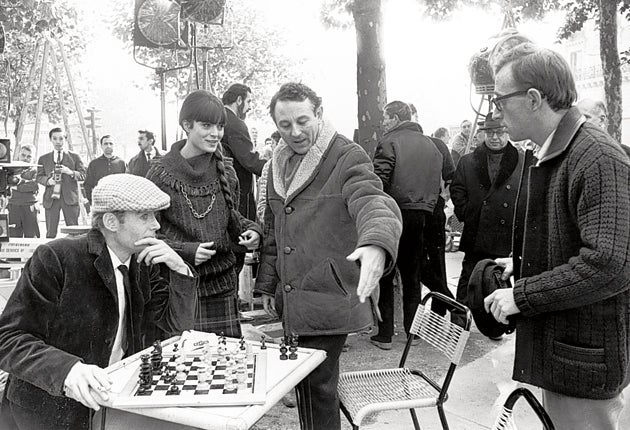Clive Donner: Film and television director best known for 'The Caretaker' and 'What's New Pussycat?'

Clive Donner directed for both film and television, and his work includes some "swinging London" comedies. But his lasting legacy includes perhaps the definitive versions of Pinter's The Caretaker and Geoffrey Household's Rogue Male.
Donner's mother ran a dress shop while his father was a violinist who played on the soundtrack of The Life and Death of Colonel Blimp (1943), and the film's director Michael Powell levered the young Donner into Denham Studios' editing room. Donner's national service ran from 1944-47 and included a stint in the Education Corps, which may account for his later facility in working with young people.
Demobbed, Donner moved to Pinewood to work with David Lean and Ronald Neame. Editing films like Madeleine (1950), Scrooge (1951) and Genevieve (1953) eventually led to a directing contract from Rank. In 1957 he directed his first film, A Secret Place, about a policeman's son who is tricked into lending his father's uniform to a gang of crooks. Shot on location in the East End, it climaxes in an exciting chase through a huge building site.
Donner's career witnessed some dizzying changes of direction, and the following year's Heart of a Child was an Alpine children's film in which a boy saves his dog from being put down. Donald Pleasence, who plays the canicidal father, would later star in Donner's first big success.
Despite these moderate successes, Donner found it difficult to sustain a film career and spent some time directing for television, including serials like Danger Man as well as adverts, all of which brought him some recognition. In 1962 he returned to the cinema with Some People, in which four Bristolian teenagers are brought back on to the straight and narrow when their music teacher (Kenneth More) encourages them to form a rock band. In this they are helped by the Duke of Edinburgh Award Scheme, which enjoyed a slice of the film's profits.
Donner's next film, Pinter's bleak and semi-absurdist The Caretaker, was his greatest success to date. Donner had not directed the stage production, but it was obvious that he should cast two of its stars, Alan Bates and Donald Pleasence, while Robert Shaw, who had joined them on Broadway, replaced Peter Woodthorpe. Though the play had been successful (Harold Hobson praised the way that Pleasence captured Davies's "blustering pitifulness"), and Pinter had written the adaptation, they had difficulty in raising finance until an intervention from angels including Noël Coward, Peter Sellers, Richard Burton and Elizabeth Taylor. Their perspicacity paid off, the film winning a Silver Bear at Berlin. The Caretaker was claustrophobically shot by the future director Nic Roeg, and he and Bates rejoined Donner for Frederic Raphael's Nothing But the Best (1964), a blackly satirical Pygmalion story about an estate agent who wants to pass himself off as posh.
The sex-farce What's New Pussycat? (1965) is now chiefly remembered for Tom Jones belting out Bacharach and David's theme song. Peter O'Toole plays a hopeless womaniser who seeks help from a psychiatrist played with a bizarre Viennese accent by Peter Sellers. With an all-star cast it threatened to spin off the track completely and Woody Allen reportedly felt that his script had been massacred. But Donner just about kept it in control and it was a huge commercial success, buttressing The Caretaker's critical acclaim.
Donner was now a hot property and in 1967 directed Luv, adapted from Murray Schisgal's play and starring Jack Lemmon, Peter Falk and Elaine May. But where with The Caretaker Donner had stuck to the original play, here he was encouraged to open the original out and the film bombed.
Back home, he took on Here We Go Round the Mulberry Bush (1968), for which Hunter Davies transferred the action of his novel from his native Carlisle to Stevenage. A sidelong glance at Sixties permissiveness, it follows a 17 year-old's desperate attempts to lose his virginity. Another small-scale success, it allowed Donner to make Alfred the Great (1969), in which David Hemmings plays the king as a neurotic. Its avowedly "anti-epic" viewpoint didn't chime with audiences and Donner, again finding it difficult to initiate projects, returned to advertising.
In 1974 he directed on stage for the only time, with Robert Patrick's Kennedy's Children, a series of downbeat monologues. Starting at the King's Head in Islington, it then followed the trajectory of The Caretaker, from The Arts Theatre to Broadway.
He now returned to film and television, hopping to and fro across the Atlantic, but without recapturing his earlier energy. 1974's Dracula spoof Vampira starred an anaemic David Niven, while The Nude Bomb (1980), a spin-off from the TV series Get Smart about a weapon that destroys clothing, is equally weak.
Donner teamed up with George C Scott for two Dickens adaptations for television, Oliver Twist (1982) and A Christmas Carol (1984), neither of which stood comparison to the 1948 and 1951 versions that Donner had edited. Among his later work for television was an adaptation of Jeffrey Archer's Not a Penny More, Not a Penny Less (1990), another stab at Arthur the King (1985) and, finally, Charlemagne (1993).
In the midst of this competent work he and O'Toole reunited for the BBC's outstanding Rogue Male (1976), adapted by Frederic Raphael from Geoffrey Household's novel. When an English aristocrat fails in his attempt to assassinate Hitler he fears he will find himself caught between the British and the Nazis. It was, deservedly, one of Donner's own favourites.
John Riley
Clive Stanley Donner, film, television and theatre director: born London 21 January 1926; married Jocelyn Rickards (died 2005); died London 6 September 2010.
Join our commenting forum
Join thought-provoking conversations, follow other Independent readers and see their replies
Comments